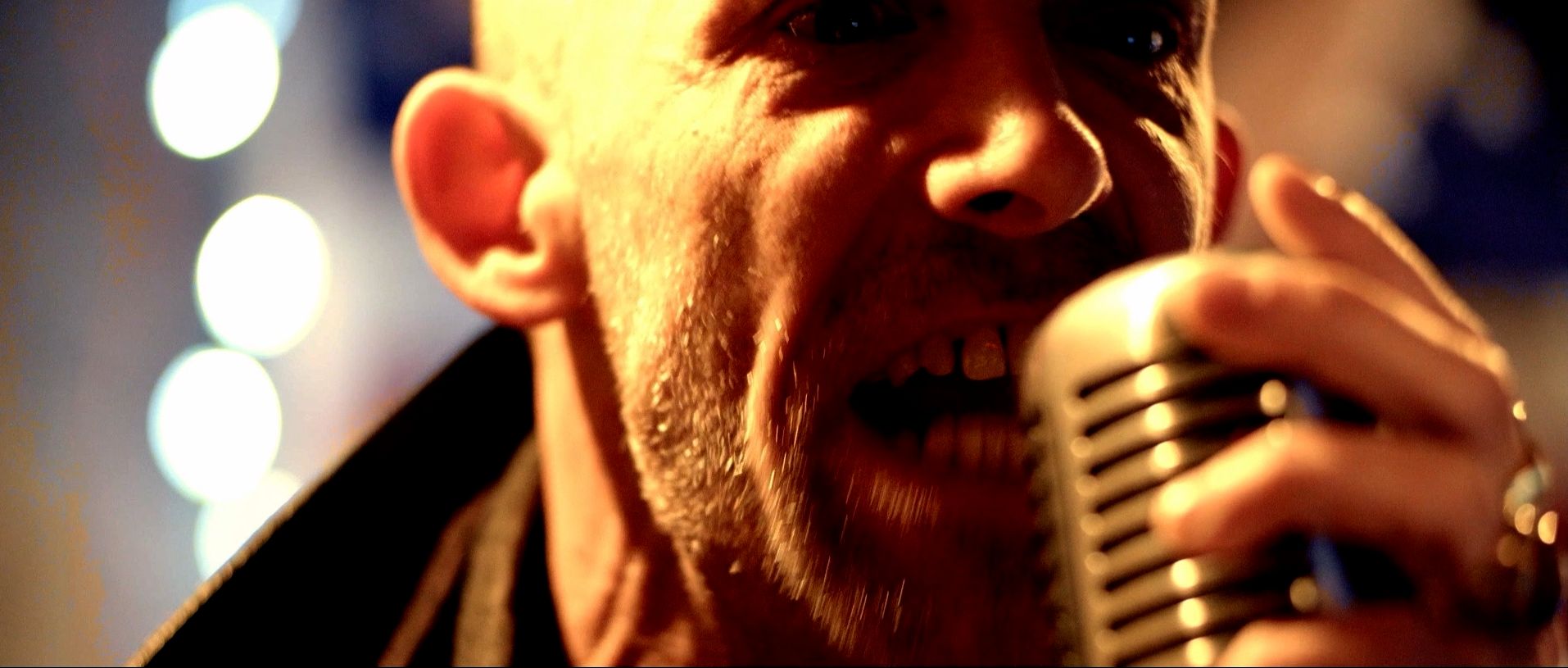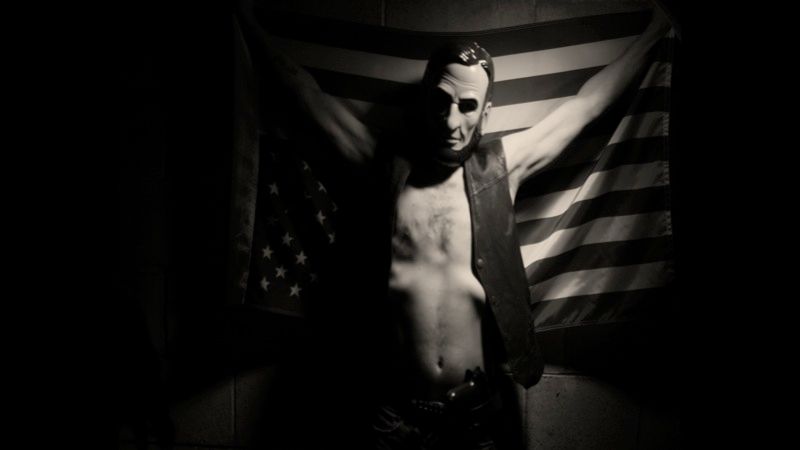
The Chronicle of 'Cactus Jack': Examining an Indie Film From Inception to Distribution
Part One: Inception & Conception
I suppose the seed was planted long ago, when as precocious kids my brother Chris and I would make our own comic books from scratch and orchestrate and act out elaborate long-form serialized storylines with our G.I. Joes, employing such exacting detail that when a Joe valiantly gave up the ghost, he or she was ceremoniously buried, complete with a cassette of the old soldier’s dirge Taps taken from our stepfather’s music collection crackling through a tinny tape player. Yes, we were committed. We literally buried some of them in the ground, a bona fide final resting place for these hard-earned, coveted playthings. To this day, I still often muse over the fact that a handful of the fallen heroes likely remain buried right where we left them decades ago under the dirt beneath our stilted military housing in the Philippines, even more deeply interred than our trowels intended after a foot-thick layer of volcanic ash blanketed Clark Air Base when Mount Pinatubo blew a mere two months or so after we were shipped back stateside.
I realize now that what we were doing was taking our unadulterated love of movies—we were those poor welfare kids who lived for the glorious gift of month-long promotional runs of HBO and Showtime in the mid-eighties, when we would park ourselves in front of the tube for weeks on end, taking in any and all manner of movies that would transport us away from our dangerous, depressing apartment complex off the DC beltway to far-off galaxies, booby-trapped tombs, war zones, scandalously comedic police academies, houses haunted by poltergeists or horny nerd fraternities and everything in between—and transposing them onto other mediums.
We weren’t just making comic books. We were storyboarding the movies in our minds. We weren’t just playing with our action figures. We were choreographing and staging set pieces. We were plotting high dramas with life-and-death stakes and reversals of fortune and beginnings and endings. We were learning to write and direct, intuitively and on the fly.
When Chris decided to start screenwriting later in life, I happily hitched myself to his wagon as we rode it full circle back to the shared joy of our youth: spinning yarns. We’d seen the world by then, lived in many different states and countries and experienced as many different cultures and customs. I’d served in the military myself. We felt we’d gathered a rather keen understanding of not only the many facets both breathtaking and monstrous that make humanity so beautifully diverse but also the universality of the lived human experience—not to mention an eye for dramatic tragedy and what I like to think is a seasoned ear for authentic, colloquial dialogue.
After a couple of starts and stops we really dove in on the screenwriting front around 2008 and found quick success. Contest placements and wins came, off of them we signed with our manager Sidney Sherman (who we’re still with all of these years later), and then with his help, agent Mike Esola at WME back when Mike was setting the spec sale world on fire. We didn’t get that big spec sale we’d dreamt of when we hooked up with Esola, but we did score a few writing assignments off of the strength of our always too-dark and too-provocative-to-buy spec scripts, sold an original pitch, and joined the WGA.
But alas, we eventually found ourselves on the hamster wheel many a middling screenwriter gets caught on: implementing endless rounds of frustrating, contradictory story notes and wasting our lives and creative mojo on bottom of the barrel IP bake-offs and open writing assignments.
We were in a position that many of our screenwriter friends were envious of … but we were miserable.
With television and streamers entering into what we might now collectively recognize as something of a “Golden Age,” we felt compelled to jump from writing features to TV but needed to land on the right story to tell. As we sought out the proper tale, I not only found out I was going to be a father but was serendipitously contacted by a half-sister whom I'd never met (we’d heard rumors of the existence of our twin half-sisters many years ago, through the grapevine) via Facebook; they—who were also sired and skipped out on by our loveable but deadbeat dad, Butch Thornton, decades prior—had found the old bandit living off the grid in a dilapidated trailer on the outskirts of Galveston, Texas. We were told he was sick and dying and wanted to see us again before he kicked the bucket. He wanted to make amends, and for us to ferry him back to a plot of land he had in Mississippi to die and to be buried. It was all too Faulkneresque to pass up. We went.
We found Butch to be in ill health, yes, but otherwise alive and kicking, still full of piss and vinegar picking a six-string under the Confederate and Jolly Roger flags flying on his sandy scrap of land peppered with ramshackle RVs inhabited by passing strangers on the lam or trying to outrun their fleet-footed demons. The bait of his “dying wish”? Just another of his many exaggerations and tall tales, like how he was a shotgun brandishing bounty hunter or worked clandestinely for the CIA or rode with murderous one-percenters.
It appeared storytelling was in our blood.
In visiting with zipper-toothed Butch and steeping in the outlaw biker and salty dog outboard motor pirate vibe of oil town Galveston, we were inspired: we found the world of belching refineries and coastal Medusa lights one we could eagerly commit to and retconned an old feature idea we had into a TV show. We wrote the pilot.
And then the world turned upside down. After the birth of my son, I was diagnosed with Stage 3 colon cancer. In a stroke of irony any writer worth their salt would find far too coincidental to work into any story, my very first day of chemo came on his very first birthday. Needless to say, these types of life events have a way of putting things into perspective.
We were sick of every project dying in Development Hell. Even if it was just a short film, I wanted something to leave behind that people could actually see in the event the cancer won. I wanted to make a movie. Chris had been living in my basement, helping out as I fought the disease. He had grown his hair and beard out into an unruly thicket bordering on “Rasputin,” and when a neighbor with a bit of a hoarding problem and very horror-friendly house asked us to look after the place when he went out of town, we decided to do the damn thing.
We conceived of a psychological horror short called Knock Knock in which a schizophrenic madman off his meds thinks he’s hearing a calamitous knocking sound that drives him further into the depths of insanity. With his matted mane, Chris played the madman. I shot the film, running around with a chemo pump attached to me pushing poison into my veins via a surgically implanted port in my chest as I captured hellish images of a dangerous man’s sanity fraying. It was fucking exhilarating. The film has a few warts, but we thought, and still maintain, we’d pulled off something quite compelling for “two guys, a camera, and fifteen bucks.” Our manager Sidney and others agreed. Validation was in hand.
We wanted to go bigger. We wanted to make a feature. But we wanted to still keep it very small and shoestring, following the Robert Rodriguez maxim of taking stock of the assets around you and exploiting them to make a micro-budget do-it-yourself feature film, as he had inspiringly done with El Mariachi. We’d finished a television pilot for the Galveston-set show we’d concocted called The Revenger, and as Sidney sent it out to agencies (we’d since left WME when we got lost in the shuffle) we brainstormed our little feature. We wanted to do something that was a complete and utter barbarically yawped “FUCK YOU!!” to the nerfed Hollywood system we’d grown so disillusioned with. Something that was dark and edgy and hard hitting, something punk as fuck that would never in a million years get past even the boldest of gatekeeping reps or execs.
As previously alluded, as youngsters we were allowed to watch pretty much anything we wanted and had always been fascinated by the subjects of hate and racism. We’d seen Roots in school in the 80’s, we’d seen The Color Purple and Mississippi Burning and as a couple of the very few white kids in our economically depressed hood in the shadow of the nation’s capitol we’d even experienced some racism ourselves (though we already well understood the tainted history of this country and why some of the black folks in our neighborhood occasionally would single us out for retribution, and why the Filipino boys armed with menacing knives would later chase our colonizing asses on BMX bikes out of spite in Timog Park).
In the following years, films like American History X and Triumph of the Spirit and A Time to Kill and La Haine and The Believer had a profound effect on us. We wanted to make a film about hate, our own entry into the pantheon … but we wanted to do it without pulling punches. We wanted to make a small, hardcore, horrific talking heads film in which completely grotesque, unvarnished hateful rhetoric was the fuel that fed its nightmare furnace. A “horror of rhetoric,” if you will. As guys who grew up in the days of “sticks and stones may break my bones, but words will never hurt me,” in this burgeoning era of “words are weapons” we wanted to challenge ourselves to make a novel horror film, to unnerve and unsettle by way of terrifying ideas and ideology expressed as much as acts of physical violence.
We took stock and inventory of our assets. We wanted to keep it as small and manageable as possible. One location, a cramped and ominous midwest basement. One venomous, terrifying character. An amalgamation of some of our greatest influences: Taxi Driver, American History X, and Oliver Stone’s criminally underrated adaptation of Eric Bogosian’s tour de force one man show Talk Radio but for the podcast generation. A story of how one psychopath with a mic and an internet connection can impact the world, and how there’s a hungry audience starving for and emboldened by his trademark vitriol—all underpinned by the notion that this monster could be living right next door to any one of us. The ability of the character to interact with and impact the outside world via his podcast would allow us to make a claustrophobic, contained horror-thriller somehow feel global in scope.
In keeping with the Rodriguez of it all we took the title of our future film from a crudely rendered, hand drawn caricature of some fictional Bukowski-like figure foisted upon us by a local Milwaukee film scene hanger-on who, knowing the modicum of success we’d achieved in Tinseltown, had dedicated himself as some sort of unsolicited factotum in the hopes that we’d read his poorly penned scripts and heaven forbid, refer him to our agent. The name of this crudely drawn creep? Cactus Jack.

We quickly realized that the most crucial asset we’d need to secure in order to pull this shit off was a hellfire fiend of an actor capable of conjuring the menace and gravitas we required to ensure the film worked not only as pointed satire, but dramatic horror. As moderate anti-socials who preferred tinkering in our creative lab to socializing and spent what little networking energy we had almost exclusively on cultivating relationships in Hollywood, we were far from connected in the Milwaukee film community—but from what we had seen there was an unfortunate dearth of local actors we thought could conceivably carry the film … save one: R. Michael Gull. This resplendently slender unholy creature was, to our knowledge, primarily an acerbic, irreverent stand-up comic, but he’d previously penned, produced, and acted in a 9/11 conspiracy-inspired indie thriller called New Day that I’d once attended the premiere of. If anyone in this burg was capable of playing someone as “prickly” as our Cactus Jack, Gull was it.
We called on the candidate, summoned him to our basement and felt him out. Pitched the project, which he seemed to immediately respond to. After a few hours of simpatico pow-wowing that revealed Gull to be a sweetheart with an artist’s duality of a rusty, serrated edge and an impromptu photo shoot callback with a couple of potential props we had laying around gathering dust like an unnervingly placid plastic Abraham Lincoln mask and an American flag, we knew we had our Jack. We knew, with his help, we could pull off this fever dream vision dancing like rotten sugarplums in our twisted minds.
What we didn’t know was that it would take us over four years to make the fucking thing.
Coming Soon—Part Two of The Chronicle of Cactus Jack: Panhandling, Pre-production, and Proving the Concept
*Feature Photo: Actor R. Michael Gull raging as the titular hatemonger supreme Cactus Jack.


